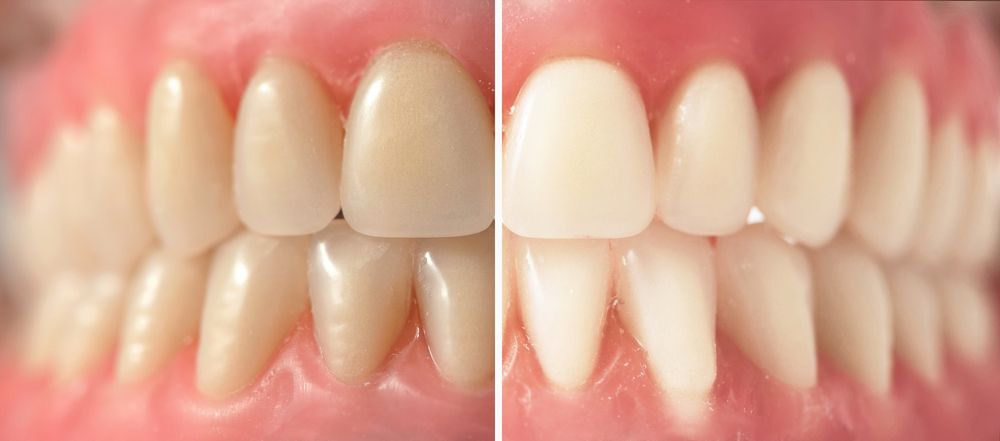Intrinsic vs. Extrinsic Tooth Stains
 Yellowed, stained, or dingy teeth can detract from a beautiful smile. Fortunately, we offer a number of cosmetic treatments at Nordhus Dentistry in Wichita, KS to brighten your smile.
Yellowed, stained, or dingy teeth can detract from a beautiful smile. Fortunately, we offer a number of cosmetic treatments at Nordhus Dentistry in Wichita, KS to brighten your smile.
The treatment recommended for you will depend on the type of tooth discoloration you have. Here, Dr. Byron J. Nordhus discusses intrinsic vs. extrinsic tooth stains, along with treatment options for both conditions.
What Are Extrinsic Tooth Stains?
Extrinsic stains are the most common type of dental discoloration. These stains affect the enamel, the outermost layer of a tooth. They typically appear yellow or brown in color.
What Causes Extrinsic Stains?
Extrinsic discoloration is caused by staining agents in the standard American diet. These include:
- Tea
- Coffee
- Red wine
- Colas
- Fruit juices
- Blueberries
- Blackberries
- Cranberries
- Tomato sauce
To prevent extrinsic staining, we recommend consuming these foods and beverages in moderation. If you cannot go without your daily caffeine, be sure to sip these beverages through a straw. This will significantly decrease the amount of time the liquid comes in contact with your teeth.
As an added measure, rinse your mouth out with water after every snack, meal, or beverage.
Treating Extrinsic Stains
Fortunately, extrinsic stains can be addressed with professional teeth whitening treatments. At our practice, we offer LaserSmile® and Zoom!® teeth whitening, both of which can be completed in our office in about one hour.
To maintain your smile, be sure to practice good oral hygiene and avoid dark-colored foods and beverages. Generally, teeth whitening results can last between 12 to 18 months before touchups are necessary.
What Are Intrinsic Tooth Stains?
In contrast to extrinsic discoloration, intrinsic stains occur deep within the tooth structure. In many cases, intrinsic stains develop as the tooth is forming. In other instances, it can be due to genetic or environmental factors.
What Causes Intrinsic Stains?
Intrinsic dental staining can be caused by a number of factors. These may include:
- Tetracycline: This antibiotic can lead to dental discoloration if administered while a tooth is developing.
- Excessive fluoride consumption: If a patient was exposed to excessive amounts of fluoride as a child, he or she is more likely to develop intrinsic stains.
- Dental trauma: Intrinsic stains can also be caused by direct injury to a tooth. For example, if trauma is sustained, blood rushes to the tooth to heal it. Unfortunately, this causes dark pigmentation to form inside the tooth.
Treating Intrinsic Stains
Unfortunately, intrinsic stains rarely respond to professional teeth whitening. However, there are other cosmetic treatments available to conceal this type of discoloration:
- Dental bonding: A composite resin material can be applied to the affected tooth. This will camouflage the stains for a more natural appearance.
- Porcelain veneers: Like bonding, porcelain veneers can conceal a number of aesthetic imperfections. Veneers are custom-crafted in a dental laboratory and are affixed to the front surfaces of the teeth. The result is a brighter, whiter, more balanced smile.
- Dental crowns: In contrast to a veneer, a dental crown covers the entire tooth structure, providing reinforcement and strength when necessary. Made from high-quality materials, crowns can mimic the natural tooth enamel and even reflect light in the same way.
Contact Our Practice for More Information
If dental stains keep you from smiling, schedule a consultation at Garden City Smiles. We can help you determine the cause of your discoloration and recommend an appropriate treatment. Contact us online anytime or call our office at (316) 721-6730.


